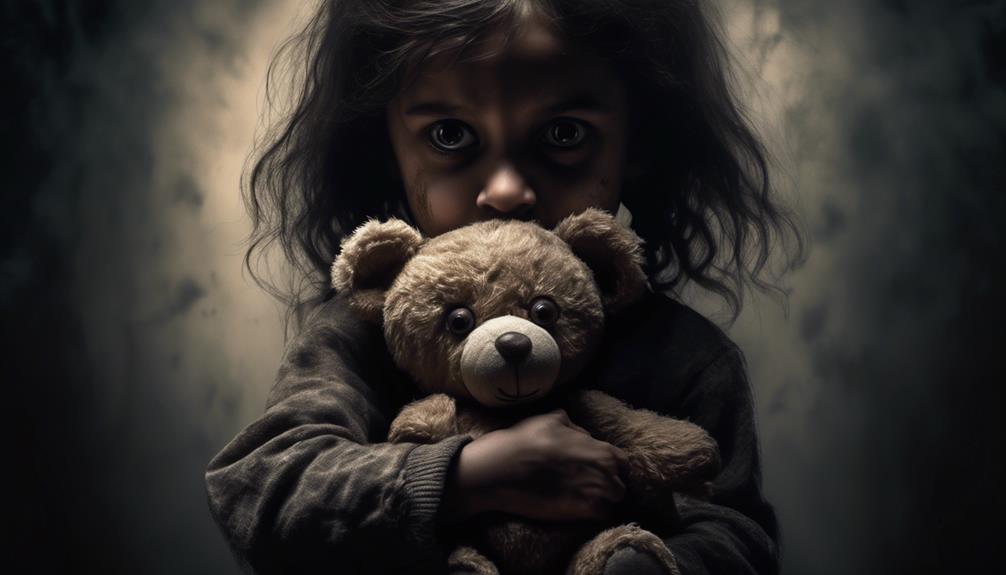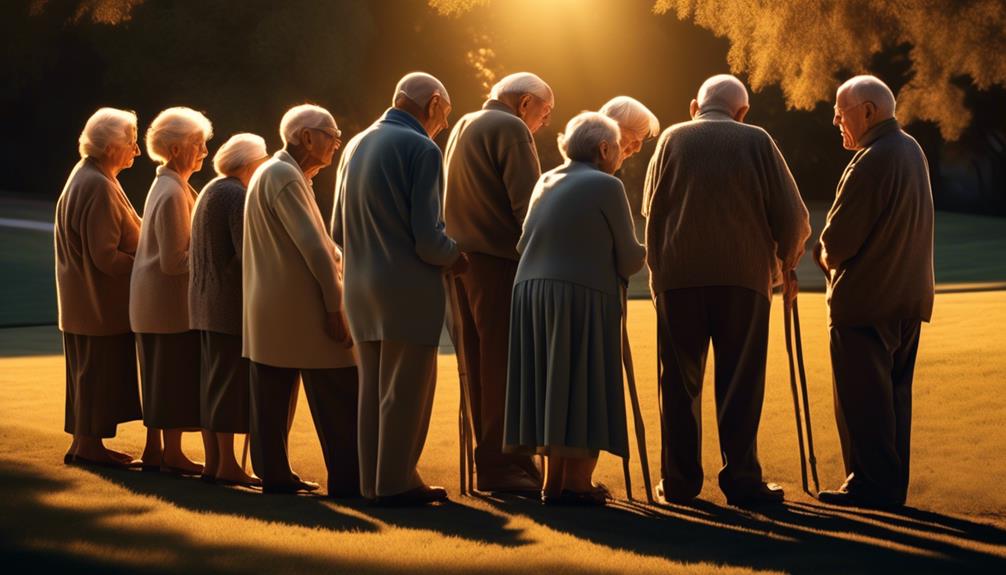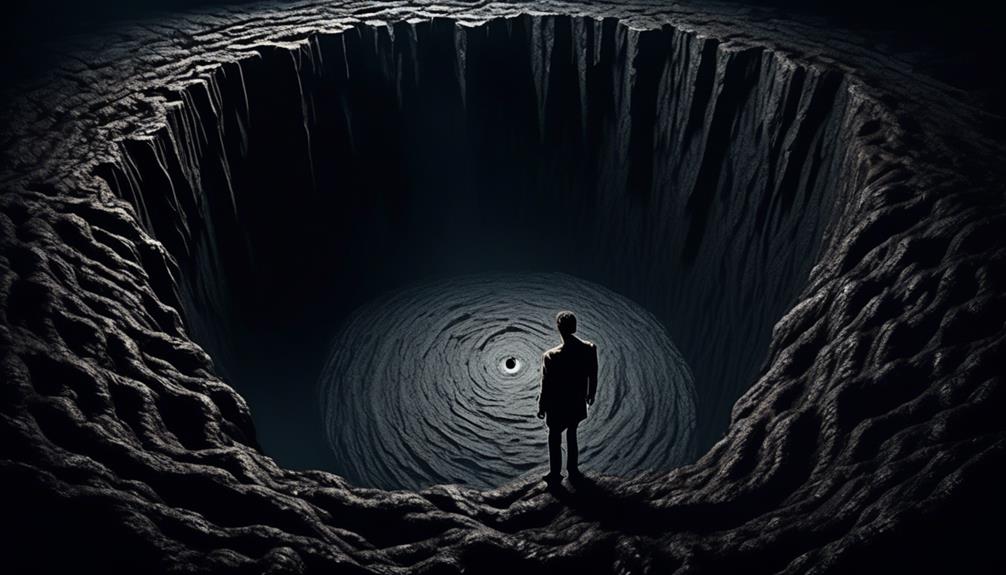Have you ever pondered which age group experiences the most intense fear of death, a universal concept that captivates and concerns us at every stage of our lives?
It's a question that may lead us to ponder the complexities of human development and the intricacies of the human psyche. Let's explore the nuances and factors that contribute to this fear in different stages of life, shedding light on the age group most affected by the looming specter of mortality.
Key Takeaways
- Children (0-8) begin understanding death gently through discussions.
- Adolescents (8-13) fear death due to increased existential awareness.
- Adolescents (13-18) struggle with fear due to cognitive-emotional interplay.
- Adults (18+) face mortality with heightened awareness and existential contemplation.
Age 0-8: Understanding Death
In the age group of 0-8, children begin to comprehend death through gentle and age-appropriate discussions, establishing the foundation for their understanding of this natural phenomenon. At this stage, kids are introduced to symbolic explanations that portray death as a part of life's cycle. While they may not fully grasp the finality of death, basic concepts begin to form in their minds.
Adults play a crucial role in shaping children's perceptions of death by engaging in sensitive conversations that address their questions and emotions.
Ages 8-13 and Fear

As children transition from ages 8 to 13, they confront the complexities of mortality and grapple with heightened fears surrounding death. At this crucial stage of development, children and adolescents between 8-13 begin to process the concept of death in a more concrete and rational manner. Here's why this age group experiences heightened fear and anxiety related to death:
- Increased Existential Awareness: Children in this age range start questioning the meaning of life, leading to a deeper understanding of mortality and the finality of death.
- Lack of Coping Mechanisms: Adolescents at this stage may struggle with sudden encounters with death, lacking the coping skills needed to navigate these challenging emotions effectively.
- Recognition of Mortality: The realization of their own mortality and the mortality of loved ones can trigger significant fear and anxiety about death.
- Grasping the Significance of Death: Children aged 8-13 are beginning to comprehend death as a profound and potentially distressing reality, contributing to their heightened fears surrounding the topic.
Ages 13-18: Fear Analysis
Analyzing the fears of mortality among adolescents aged 13-18 reveals a complex interplay of cognitive understanding, emotional responses, and physiological reactions to the concept of death. Teenagers in this age group often struggle with sudden death, leading to a heightened fear of mortality. The fear of death in ages 13-18 is marked by a mix of logical processing, emotional turmoil, and physical symptoms of fear. Adolescents lack well-established coping mechanisms for death, intensifying their fear and making it challenging to navigate.
During this stage of development, teenagers grapple with the concept of death as a real and permanent phenomenon. This struggle contributes to the intensity of their fear of mortality. It's essential to provide support and understanding to adolescents facing these fears, helping them develop healthy ways to cope with the existential uncertainties surrounding life and death. By acknowledging and addressing the cognitive, emotional, and physiological aspects of their fear, we can assist adolescents in navigating their fear of death during this critical stage of development.
Age 18+: Facing Mortality

Understanding the complexities and nuances of mortality becomes increasingly profound for individuals aged 18 and above. This age group faces mortality with a mix of fear and contemplation, grappling with existential questions and the meaning of life. Here are some key points to consider:
- Heightened Awareness: Adults over 18 have a heightened awareness of mortality, feeling death anxiety more intensely than younger individuals.
- Existential Fears: Fear of death in this age group is less extreme than in adolescents, but adults may struggle with existential fears and questions about life's meaning, influencing their fear of death.
- Contemplation of Life: Awareness of mortality leads to a deeper contemplation of life and death, shaping individuals' perspectives on existence.
- Natural Part of Life: Understanding death as a natural part of life becomes more pronounced for those aged 18 and above, impacting their coping mechanisms and fear of death.
Navigating these existential challenges requires empathy and understanding as individuals in this age group confront mortality and seek meaning in their lives.
Influential Factors on Mortality Fear
Investigating the interplay of various factors sheds light on the complexities of mortality fear across different age groups. As individuals age, fear of death tends to decrease, with older individuals exhibiting lower levels of mortality fear compared to younger and middle-aged adults. This trend may be attributed to a sense of acceptance and a shift in priorities towards other aspects of life.
However, the awareness of approaching the end of life can heighten death fears, particularly when coupled with health concerns and chronic illnesses. Factors such as overall health, the presence of a clear purpose in life, and discrepancies between desired and expected time left to live also play significant roles in influencing mortality fear.
It's essential to consider these influential factors when addressing fears related to death, as they can impact an individual's psychological well-being and quality of life. By understanding these dynamics, we can better support individuals in navigating their fears and finding peace as they approach the later stages of life.
Frequently Asked Questions
What Age Group Is More Fearful of Death?
We understand the deep-seated concerns individuals have about death at different stages of life. Fear of death varies across age groups, with middle-aged adults often experiencing heightened levels of anxiety due to increased awareness of mortality.
Younger adults also grapple with existential uncertainties, while older adults generally exhibit lower levels of fear as they may have developed coping mechanisms over time. Recognizing these distinctions can guide tailored interventions to support individuals at various life stages.
Who Is Most Likely to Be Anxious About Death?
We find that individuals in their 40s and 50s are often most anxious about death. This age group tends to grapple with existential questions and the significance of life, which can heighten fears of mortality.
While fear of death may peak during middle age, studies show that older adults generally experience lower levels of death anxiety.
Understanding these dynamics can help us provide support and guidance to those facing these concerns.
What Age Do You Stop Worrying About Death?
As we consider the question of when one stops worrying about death, it's crucial to recognize the various factors that influence this transition.
Factors such as awareness of one's mortality, health status, and acceptance of the inevitable can all play a role in shaping our attitudes towards death.
These elements contribute to a unique journey for each individual, with some finding peace and acceptance earlier in life, while others may grapple with fear until later years.
Why Are Older People Less Fearful of Death?
Understanding why older individuals are less fearful of death is crucial. As we age, we often gain a deeper appreciation for life's journey, allowing us to accept mortality more readily.
Our accumulated experiences and broader perspectives provide a sense of peace and understanding. This realistic outlook on death as a natural part of life helps diminish fear and anxiety.
Age truly offers a unique lens through which to view mortality.
Conclusion
In conclusion, it's clear that adolescents, aged 13-18, are the age group most fearful of death. This fear stems from a heightened awareness of mortality and a lack of coping mechanisms.
As they grapple with the finiteness of life, it's crucial for adults to provide support and guidance.
Remember, facing death is like facing the music – it may be daunting, but it's a part of life that we must navigate with empathy and understanding.









